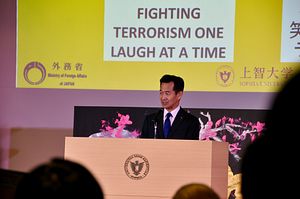Women across the Asia-Pacific region are susceptible to violent extremist propaganda but are more inclined to engage with such material privately, experts said at an event in Tokyo last week. That might make it harder to identify clear signs that someone is going down the path of radicalization.
The warning is based on the early results of research into online habits in Malaysia, Indonesia, Bangladesh, and the Philippines. It’s one piece of the “Empowered Women, Peaceful Communities” project run by UN Women and funded by the Japanese government, which has been anxious to prevent the spread of extremism in its neighborhood.
Analysts at Moonshot CVE were commissioned by UN Women to produce a gender breakdown of support for violent extremism in the region. While the full data will not be published until next month, the preliminary results should be of interest to policymakers seeking to craft effective, targeted counterextremism programs. Among those in Malaysia accessing extremist content on Facebook, for example, 28 percent were women and 72 percent were men. However, in the realm of search engines – which users might perceive to be more “private” – Malaysia’s gender breakdown for such browsing was nearly 50-50.
In the three other countries studied, the female share of such searches was not as high as in Malaysia (ranging from 11 percent in Bangladesh to 34 percent in Indonesia and the Philippines). “Nonetheless,” noted a report by Moonshot CVE, “the gap between male and female sympathy or support for violently extremist content was still narrower in ‘private’ searches than in publicly available Facebook data. In other words, women were more likely to engage with extremist content when they thought nobody would know.”
This chimes with a related study into the threat of radicalization among Muslim women and men in Indonesia. The Wahid Foundation found that men were more likely than women to be willing to participate in attacks, raids, demonstrations, or protests, but the gender gap was very small when it came to making donations in material form or persuading people.
Hanny Cueva Beteta, a regional policy adviser with UN Women, said the research showed that women were engaged and interested in extremist material. “They are agents of peace but they are not only agents of peace,” she told me in an interview in Tokyo. “What we’re trying to say is: the same as men, they are being radicalized and we need to look at them as a group that is at risk. The second thing is that when they are radicalized, the space in which they will be more comfortable is the private sphere, which will make them harder to identify.”
The release of the initial findings coincided with a UN Women event supported by the Japanese Ministry of Foreign Affairs (MOFA). The March 1 function showcased efforts to create shareable, funny videos that tackle gender stereotypes while also undercutting the appeal of extremist messaging. Moonshot CVE highlighted that violent sexual and violent jihadist content often appeared in the same online spaces, indicating the need to counter both problems at the same time.
Mitsunari Okamoto, a MOFA parliamentary vice minister, told the audience at Sophia University that the government would continue to step up its support for UN Women’s activities. Japan contributed about $30 million to the agency in 2016, according to the country’s most recent diplomatic bluebook. That made it the second-biggest government donor after Sweden, the UN Women annual report said.
Tokyo’s support for the agency has been growing over the past few years, apparently in line with Prime Minister Shinzo Abe’s pledge in to make women’s empowerment “a thread guiding Japan’s diplomacy.” He told the UN General Assembly in 2013: “Japan respects the activities of UN Women and intends to become one of its leading contributors and thus an exemplary country in the area.”
Japan intensified its focus on violent extremism across the region after seeing some of its citizens fall victim to terrorist attacks. The fatalities from the attack on the Holey Artisan Bakery in Dhaka, Bangladesh, in July 2016 included seven people associated with the Japan International Cooperation Agency.
“We managed to get the interest of the Japanese with their agenda to push on women’s empowerment around the world and connect it to one of the biggest themes of our time [terrorism],” UN Women Asia-Pacific regional director Miwa Kato said in an interview. She added that the Japanese government-backed project was very broad but included community engagement, economic development, and use of social influencers to spread positive messages.
The project’s next steps may become clearer after the more detailed research is published in April. One option is to build a risk profile for specific geographical regions, although this type of thorough breakdown is unlikely to be released publicly.

































